解决拟合与过拟合问题的方法:
一、网络层数选择
代码如下:
1 # encoding: utf-8 2 3 import tensorflow as tf 4 import numpy as np 5 import seaborn as sns 6 import os 7 import matplotlib.pyplot as plt 8 from sklearn.datasets import make_moons 9 from sklearn.model_selection import train_test_split 10 from tensorflow.keras import layers, Sequential, optimizers, losses, metrics 11 from tensorflow.keras.layers import Dense 12 13 N_SAMPLES = 1000 # 采样点数 14 N_Epochs = 300 15 TEST_SIZE = 0.3 # 测试数量比率 16 OUTPUT_DIR = r'G:2020python' 17 if not os.path.exists(OUTPUT_DIR): 18 os.mkdir(OUTPUT_DIR) 19 20 # 产生一个简单的样本数据集,半环形图,类似的有make_circles,环形数据 21 X, y = make_moons(n_samples=N_SAMPLES, noise=0.25, random_state=100) # (1000, 2),(1000, 1) 22 # 将矩阵随机划分训练集和测试集 (700,2),(300,2),(700,1),(300,1) 23 X_train, X_test, y_train, y_test = train_test_split(X, y, test_size=TEST_SIZE, random_state=42) 24 print(X.shape, y.shape) 25 26 27 def make_plot(X, y, plot_name, file_name, XX=None, YY=None, preds=None): 28 plt.figure() 29 axes = plt.gca() 30 x_min = X[:, 0].min() - 1 31 x_max = X[:, 0].max() + 1 32 y_min = X[:, 1].min() - 1 33 y_max = X[:, 1].max() + 1 34 axes.set_xlim([x_min, x_max]) 35 axes.set_ylim([y_min, y_max]) 36 axes.set(xlabel="$x_l$", ylabel="$x_2$") 37 38 # 根据网络输出绘制预测曲面 39 # markers = ['o' if i == 1 else 's' for i in y.ravel()] 40 # plt.scatter(X[:, 0], X[:, 1], c=y.ravel(), s=20, cmap=plt.cm.Spectral, edgecolors='none', m=markers) 41 if XX is None and YY is None and preds is None: 42 yr = y.ravel() 43 for step in range(X[:, 0].size): 44 if yr[step] == 1: 45 plt.scatter(X[step, 0], X[step, 1], c='b', s=20, cmap=plt.cm.Spectral, edgecolors='none', marker='o') 46 else: 47 plt.scatter(X[step, 0], X[step, 1], c='r', s=20, cmap=plt.cm.Spectral, edgecolors='none', marker='s') 48 plt.savefig(OUTPUT_DIR+'/'+file_name) 49 # plt.show() 50 else: 51 plt.contour(XX, YY, preds, cmap=plt.cm.autumn, alpha=0.8) 52 plt.scatter(X[:, 0], X[:, 1], c=y, s=20, cmap=plt.cm.autumn, edgecolors='k') 53 plt.rcParams['font.sans-serif'] = ['SimHei'] # 解决plt.title乱码的问题 54 plt.rcParams['axes.unicode_minus'] = False 55 plt.title(plot_name) 56 plt.savefig(OUTPUT_DIR+'/'+file_name) 57 # plt.show() 58 59 60 make_plot(X, y, None, "exam7_dataset.svg") 61 62 # 创建网络 5种不同的网络 63 for n in range(5): 64 model = Sequential() # 创建容器 65 model.add(Dense(8, input_dim=2, activation='relu')) # 第一层 66 for _ in range(n): 67 model.add(Dense(32, activation='relu')) 68 model.add(Dense(1, activation='sigmoid')) # 创建末尾一层 69 model.compile(loss='binary_crossentropy', optimizer='adam', metrics=['accuracy']) # 模型的装配 70 history = model.fit(X_train, y_train, epochs=N_Epochs, verbose=1) 71 # 绘制不同层数的网络决策边界曲线 72 x_min = X[:, 0].min() - 1 73 x_max = X[:, 0].max() + 1 74 y_min = X[:, 1].min() - 1 75 y_max = X[:, 1].max() + 1 76 # XX(477, 600), YY(477, 600) 77 XX, YY = np.meshgrid(np.arange(x_min, x_max, 0.01), np.arange(y_min, y_max, 0.01)) # 创建网格 78 Z = model.predict_classes(np.c_[XX.ravel(), YY.ravel()]) # (286200, 1) [0 or 1] 79 preds = Z.reshape(XX.shape) 80 title = "网络层数({})".format(n) 81 file = "网络容量%f.png" % (2+n*1) 82 make_plot(X_train, y_train, title, file, XX, YY, preds)
5种网络层数的拟合效果如下:


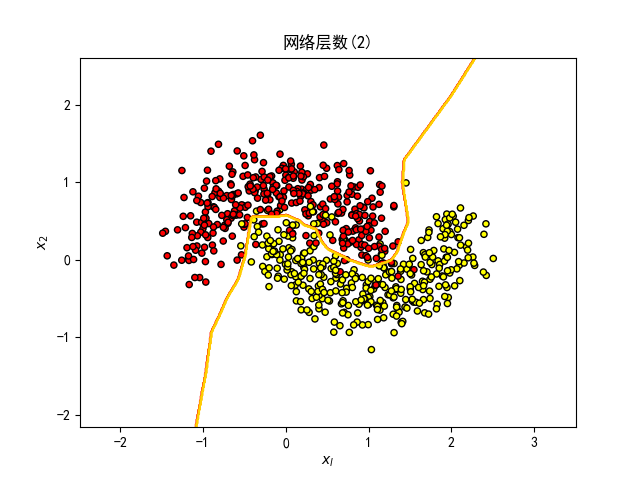
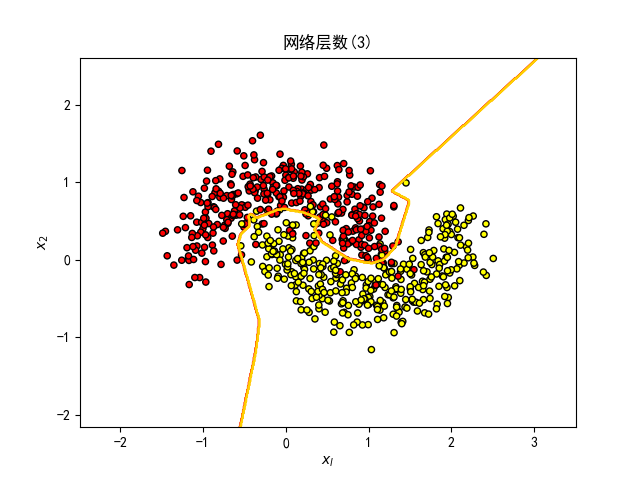
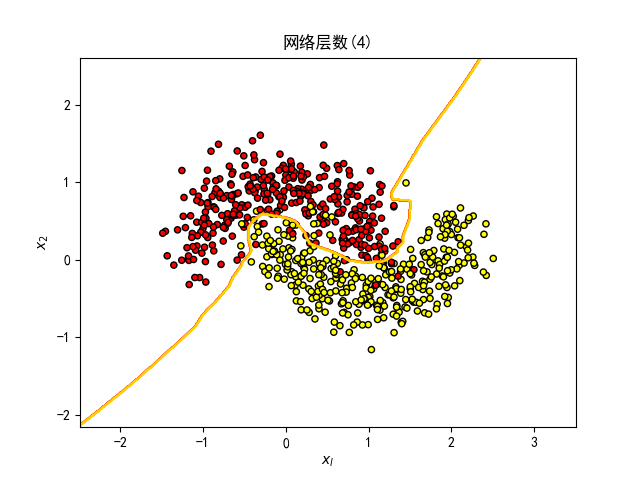
可知网络层数为1,拟合结果较为合理
二、Dropout的影响
代码如下:
1 # 创建网络 5种不同数量的Dropout层的网络 2 for n in range(5): 3 model = Sequential() # 创建容器 4 model.add(Dense(8, input_dim=2, activation='relu')) # 第一层 5 counter = 0 6 for _ in range(5): # 网络层数固定为5 7 model.add(Dense(64, activation='relu')) 8 if counter < n: # 添加n个Dropout层 9 counter += 1 10 model.add(layers.Dropout(rate=0.5)) 11 model.add(Dense(1, activation='sigmoid')) # 创建末尾一层 12 model.compile(loss='binary_crossentropy', optimizer='adam', metrics=['accuracy']) # 模型的装配 13 history = model.fit(X_train, y_train, epochs=N_Epochs, verbose=1) 14 # 绘制不同层数的网络决策边界曲线 15 x_min = X[:, 0].min() - 1 16 x_max = X[:, 0].max() + 1 17 y_min = X[:, 1].min() - 1 18 y_max = X[:, 1].max() + 1 19 # XX(477, 600), YY(477, 600) 20 XX, YY = np.meshgrid(np.arange(x_min, x_max, 0.01), np.arange(y_min, y_max, 0.01)) # 创建网格 21 Z = model.predict_classes(np.c_[XX.ravel(), YY.ravel()]) # (286200, 1) [0 or 1] 22 preds = Z.reshape(XX.shape) 23 title = "Dropout({})".format(n) 24 file = "Dropout%f.png" % (n) 25 make_plot(X_train, y_train, title, file, XX, YY, preds)
结果如下图所示:
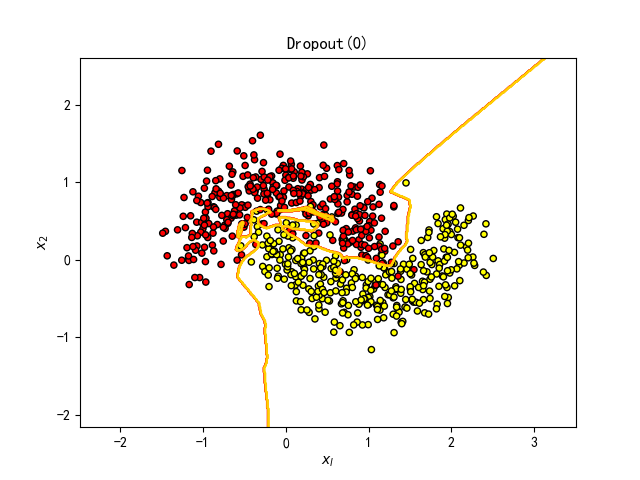

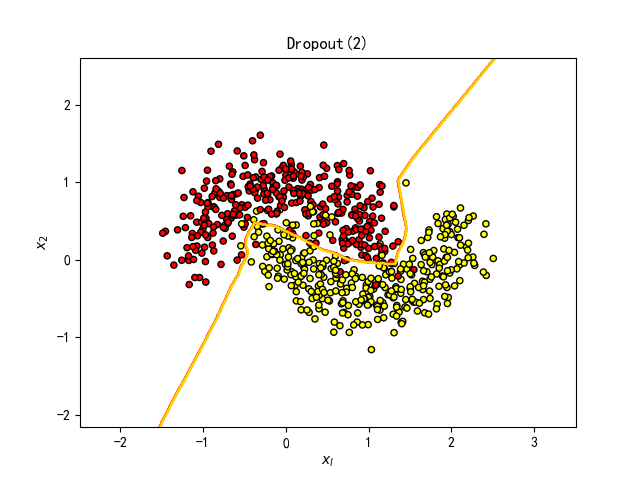
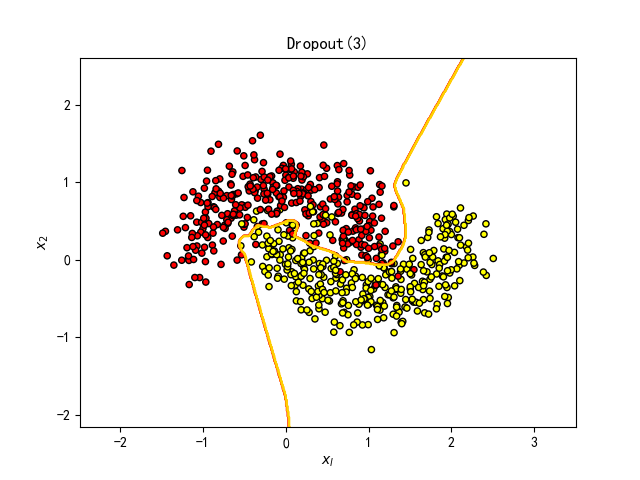

dropout训练断开一定网络连接,避免过拟合,测试时连接,
发现4层Dropout层效果最好。
三、正则化的影响
1 # encoding: utf-8 2 3 import tensorflow as tf 4 import numpy as np 5 import seaborn as sns 6 import os 7 import matplotlib.pyplot as plt 8 from sklearn.datasets import make_moons 9 from sklearn.model_selection import train_test_split 10 from tensorflow.keras import layers, Sequential, optimizers, losses, metrics, regularizers 11 from tensorflow.keras.layers import Dense 12 from pandas import * 13 from mpl_toolkits.mplot3d import Axes3D 14 15 N_SAMPLES = 1000 # 采样点数 16 # N_Epochs = 300 # 网络层数 17 # N_Epochs = 500 # dropout 18 N_Epochs = 300 # 正则化 19 TEST_SIZE = 0.3 # 测试数量比率 20 # weight_values = [[1,2,3,4],[2,3,4,1],[3,4,1,2],[4,1,2,3],[1,4,3,2]] # 测试用 21 weight_values = [] 22 OUTPUT_DIR = r'G:2020python' 23 if not os.path.exists(OUTPUT_DIR): 24 os.mkdir(OUTPUT_DIR) 25 26 # 产生一个简单的样本数据集,半环形图,类似的有make_circles,环形数据 27 X, y = make_moons(n_samples=N_SAMPLES, noise=0.25, random_state=100) # (1000, 2),(1000, 1) 28 # 将矩阵随机划分训练集和测试集 (700,2),(300,2),(700,1),(300,1) 29 X_train, X_test, y_train, y_test = train_test_split(X, y, test_size=TEST_SIZE, random_state=42) 30 print(X.shape, y.shape) 31 32 33 def make_plot(X, y, plot_name, file_name, XX=None, YY=None, preds=None): 34 plt.figure() 35 axes = plt.gca() 36 x_min = X[:, 0].min() - 1 37 x_max = X[:, 0].max() + 1 38 y_min = X[:, 1].min() - 1 39 y_max = X[:, 1].max() + 1 40 axes.set_xlim([x_min, x_max]) 41 axes.set_ylim([y_min, y_max]) 42 axes.set(xlabel="$x_l$", ylabel="$x_2$") 43 44 # 根据网络输出绘制预测曲面 45 # markers = ['o' if i == 1 else 's' for i in y.ravel()] 46 # plt.scatter(X[:, 0], X[:, 1], c=y.ravel(), s=20, cmap=plt.cm.Spectral, edgecolors='none', m=markers) 47 if XX is None and YY is None and preds is None: 48 yr = y.ravel() 49 for step in range(X[:, 0].size): 50 if yr[step] == 1: 51 plt.scatter(X[step, 0], X[step, 1], c='b', s=20, cmap=plt.cm.Spectral, edgecolors='none', marker='o') 52 else: 53 plt.scatter(X[step, 0], X[step, 1], c='r', s=20, cmap=plt.cm.Spectral, edgecolors='none', marker='s') 54 plt.savefig(OUTPUT_DIR+'/'+file_name) 55 # plt.show() 56 else: 57 plt.contour(XX, YY, preds, cmap=plt.cm.autumn, alpha=0.8) 58 plt.scatter(X[:, 0], X[:, 1], c=y, s=20, cmap=plt.cm.autumn, edgecolors='k') 59 plt.rcParams['font.sans-serif'] = ['SimHei'] # 解决plt.title乱码的问题 60 plt.rcParams['axes.unicode_minus'] = False 61 plt.title(plot_name) 62 plt.savefig(OUTPUT_DIR+'/'+file_name) 63 # plt.show() 64 65 66 # make_plot(X, y, None, "exam7_dataset.svg") 67 68 69 # 正则化影响 5层神经网络 70 def build_model_with_reglarization(_lambda): 71 # 创建带正则化的神经网络 72 model = Sequential() 73 model.add(Dense(8, input_dim=2, activation='relu')) # 不带正则化 74 model.add(Dense(256, activation='relu', kernel_regularizer=regularizers.l2(_lambda))) # 带L2正则化 75 model.add(Dense(256, activation='relu', kernel_regularizer=regularizers.l2(_lambda))) # 带L2正则化 76 model.add(Dense(256, activation='relu', kernel_regularizer=regularizers.l2(_lambda))) # 带L2正则化 77 model.add(Dense(1, activation='sigmoid')) 78 model.compile(loss='binary_crossentropy', optimizer='adam', metrics=['accuracy']) 79 return model 80 81 82 def draw_weights_table(weights): 83 cols_label = ['regularizer lambda', 'W Min', 'W Max', 'W Mean'] 84 fig = plt.figure(figsize=(9, 4)) 85 ax = fig.add_subplot(111, frameon=True, xticks=[], yticks=[]) 86 the_table = plt.table(cellText=weights, colWidths=[0.1]*4, colLabels=cols_label, loc='center', cellLoc='center') 87 the_table.set_fontsize(35) # 改变不了字体大小 88 the_table.scale(2.5, 2.58) 89 plt.rcParams['font.sans-serif'] = ['SimHei'] # 解决plt.title乱码的问题 90 plt.rcParams['axes.unicode_minus'] = False 91 plt.title("权值信息表", fontsize=30) 92 plt.savefig(OUTPUT_DIR + '/' + "权值信息表.png") 93 plt.show() 94 95 96 def plot_weights_matrix(model, layer_index, plot_title, file_name, _lambda): 97 para = model.trainable_variables 98 weights = para[2*layer_index].numpy() 99 w_min = weights.min() 100 w_max = weights.max() 101 w_mean = np.mean(weights) 102 values = np.array([_lambda, w_min, w_max, w_mean], dtype=np.float64) 103 values = values.reshape(1, 4) 104 weight_values.append(values) 105 x = np.arange(0, 256, 1) 106 y = np.arange(0, 256, 1) 107 X, Y = np.meshgrid(x, y) 108 fig = plt.figure() 109 ax = Axes3D(fig) 110 ax.plot_surface(X, Y, weights, rstride=1, cstride=1, cmap=plt.cm.jet) 111 plt.rcParams['font.sans-serif'] = ['SimHei'] # 解决plt.title乱码的问题 112 plt.rcParams['axes.unicode_minus'] = False 113 plt.title(plot_title) 114 plt.savefig(OUTPUT_DIR + '/' + file_name) 115 # plt.show() 116 117 118 for _lambda in [1e-5, 1e-3, 1e-1, 0.12, 0.13]: 119 model = build_model_with_reglarization(_lambda) 120 history = model.fit(X_train, y_train, epochs=N_Epochs, verbose=1) 121 # 绘制权值范围 122 layer_index = 2 # 选取第二层的权值 123 plot_title = "正则化-[lambda = {}]".format(str(_lambda)) 124 file_name = "正则化-权值%f.png" % _lambda 125 # 绘制网络权值范围图 126 plot_weights_matrix(model, layer_index, plot_title, file_name, _lambda) 127 # 绘制不同层数的网络决策边界曲线 128 x_min = X[:, 0].min() - 1 129 x_max = X[:, 0].max() + 1 130 y_min = X[:, 1].min() - 1 131 y_max = X[:, 1].max() + 1 132 # XX(477, 600), YY(477, 600) 133 XX, YY = np.meshgrid(np.arange(x_min, x_max, 0.01), np.arange(y_min, y_max, 0.01)) # 创建网格 134 Z = model.predict_classes(np.c_[XX.ravel(), YY.ravel()]) # (286200, 1) [0 or 1] 135 preds = Z.reshape(XX.shape) 136 title = "正则化({})".format(_lambda) 137 file = "正则化%f.png" % _lambda 138 make_plot(X_train, y_train, title, file, XX, YY, preds) 139 140 draw_weights_table(weight_values)
正则化结果:
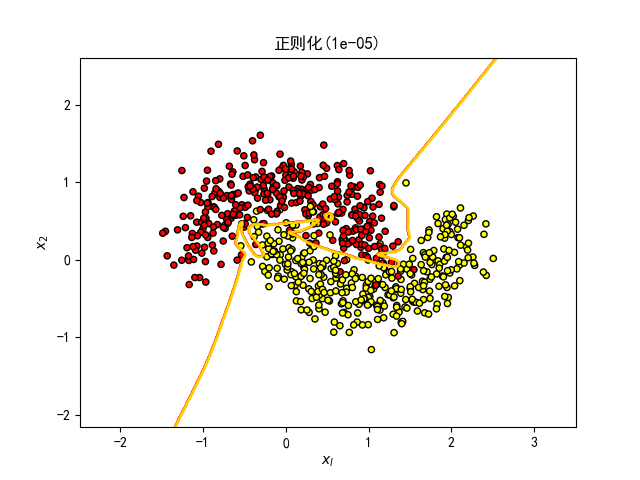


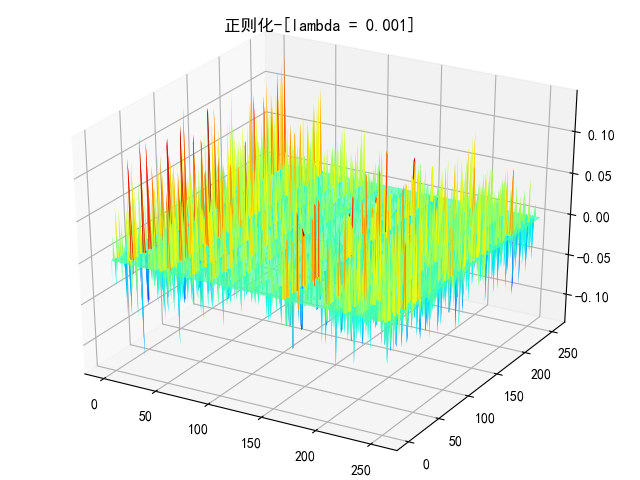

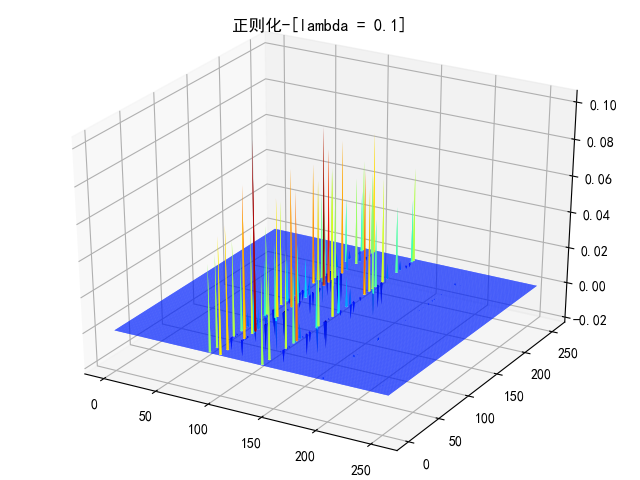
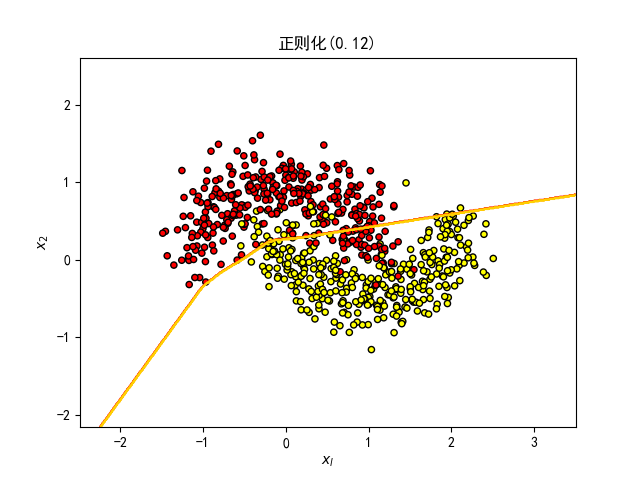
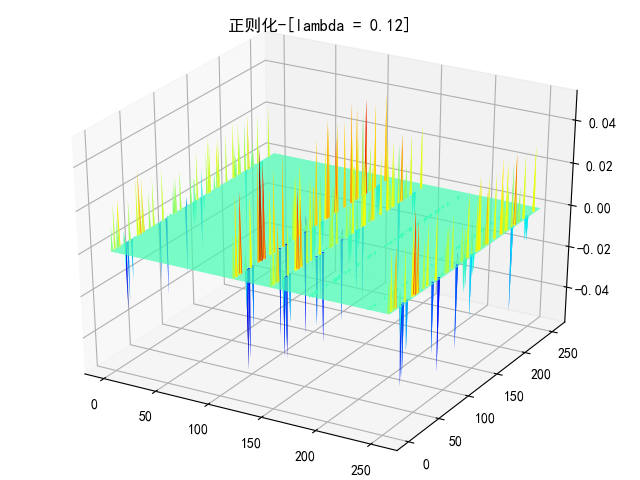


正则化L2的值为0.001适合